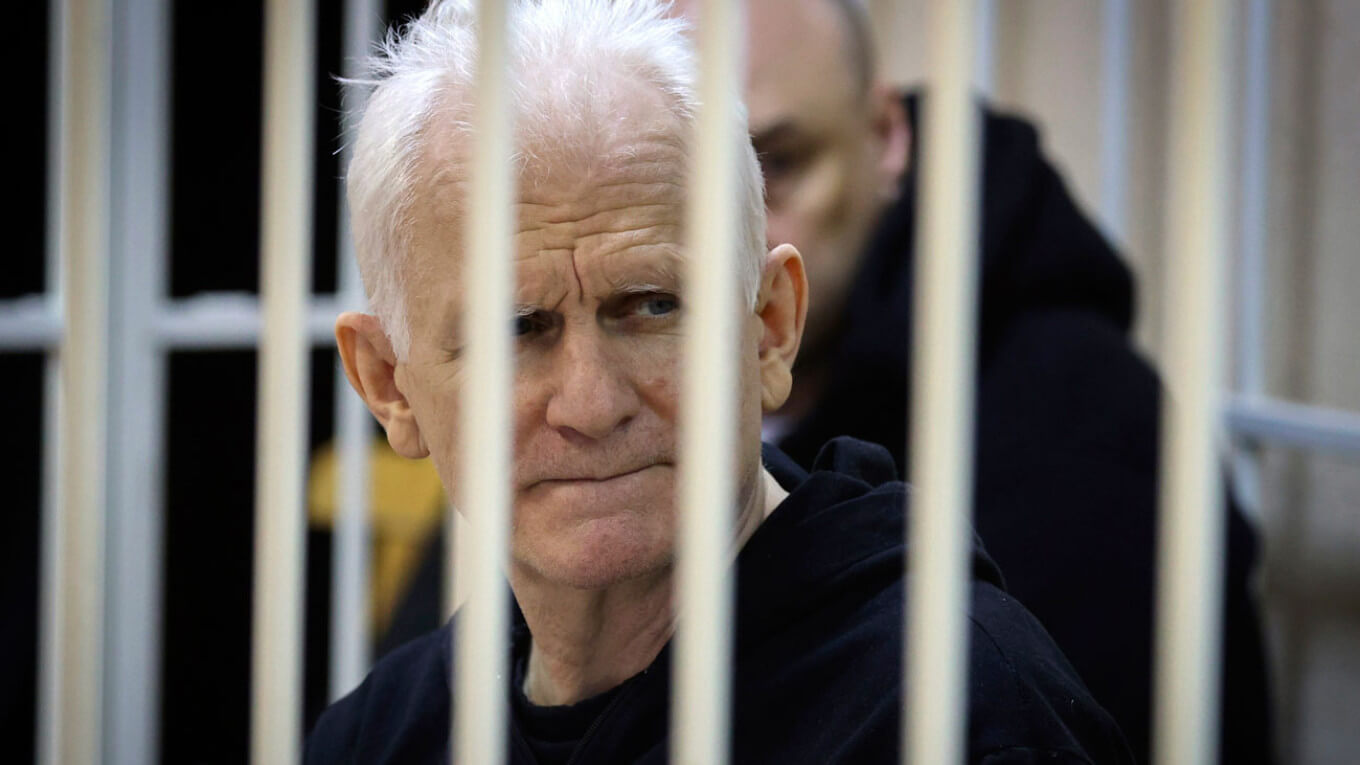On Friday, the Lieninski District Court of Minsk sentenced Belarusian human rights group Viasna’s Chairman and Nobel Peace Prize winner Ales Bialiatski to 10 years in prison for financing the 2020 anti-government protests and smuggling money, which resulted in “actions grossly violating the public order.”
Alongside him, fellow human rights activists Valentin Stefanovich and Vladimir Labkovich received nine and seven years of imprisonment, respectively. Further, another Viasna member, Dmitry Solovyov, was sentenced to eight years in prison in absentia.
Nobel Peace Prize laureate Ales Bialiatski has been sentenced to 10 yrs in prison, Valiantsin Stefanovic to 9 yrs & Uladzimir Labkovich to 7 yrs in the regime's fake trial against human rights defenders. We must do everything to fight against this shameful injustice & free them. pic.twitter.com/r2y68QIjrO
— Sviatlana Tsikhanouskaya (@Tsihanouskaya) March 3, 2023
Viasna, which was established in 1996, is Belarus’ most prominent human rights group, which tracks President Aleksander Lukashenko and his security forces’ authoritarian leanings.
Bialiatski was awarded the Nobel Peace Prize in October, along with other Ukrainian and Russian human rights groups, for being an advocate of human rights and promoting democracy in Belarus, which has been under a dictator-like regime for over 30 years.
International Reactions
In a statement, Viasna called it a “politically motivated persecution,” demanding the release of all four and other political prisoners. “We will not stop our human rights activities,” it declared.
“Caged and handcuffed human rights champions, this is what the Belarusian justice looks like today”
— Viasna (@viasna96) March 3, 2023
We will not stop our human rights activities, says Human Rights Center Viasna statement.https://t.co/TumvV4CGPz pic.twitter.com/4mRNpNkcb5
Furthermore, Viasna Spokesperson Kostya Staradubets said the sentences given were “breaking our hearts” and called the jail conditions “horrific,” with “poorly lit cells, no fresh air, no sunlight, poor food, little or no healthcare.”
In a similar vein, Bialiatski’s wife, Natalya Pinchuk, noted that the trial was “obviously against human rights defenders for their human rights work,” stating it to be a “cruel” verdict.
Appalled by the sentencing of Nobel Peace Prize and Sakharov Prize laureate Ales Bialiatski to 10 years in prison.
— Roberta Metsola (@EP_President) March 3, 2023
Politically motivated rulings against Bialiatski and @viasna96 activists are an insult to justice.
I call for their release. @Europarl_EN supports a free Belarus.
Belarus’ exiled opposition leader, Sviatlana Tikhanovskaya, opined that the sentence was “simply appalling,” while Norwegian Nobel Committee Chair Berit Reiss-Andersen remarked that the verdict was a “tragedy” with “politically motivated” charges.
US Secretary of State Antony Blinken described the court ruling as a “sham” and “an attempt to suppress democracy and human rights in Belarus,” urging for the immediate release of the four men.
Along the same lines, EU foreign policy chief Josep Borrell condemned the “sham trials” as “another example of Lukashenko regime trying to silence those who stand up for human rights in Belarus.”
The #Belarus regime continues its brutal repression@viasna96 Chair & #NobelPeacePrize winner Ales Bialiatski & his colleagues were sentenced on politically motivated charges.
— Josep Borrell Fontelles (@JosepBorrellF) March 3, 2023
They must be immediately released together with all wrongly detained independent voices in Belarus https://t.co/FZT1AjairV
German Minister of Foreign Affairs Annalena Baerbock, too, called the court case “a farce.”
Likewise, Polish PM Mateusz Morawiecki noted that the Belarusian authorities “have repeatedly tried to silence him, but Ales Bialiatski never conceded in his fight for human rights and democracy in Belarus.”
Background
Lukashenko, who has been in power for over 26 years, secured another six-term as president in August 2020, which led tens of thousands of citizens to the streets to protest the results, calling for his resignation. The opposition claimed that the election was rigged and demanded re-election followed by significant constitutional reforms.
Belarusian authorities cracked down heavily on protests, detaining hundreds every day, and imprisoning critics and journalists. The country’s main opposition candidate, Sviatlana Tsikhanovskaya, took refuge in neighbouring Lithuania due to security concerns.
"It just so happens that people who value freedom the most are often deprived of it." – Ales Bialiatski's 2022 #NobelPeacePrize lecture.
— The Nobel Prize (@NobelPrize) March 3, 2023
Bialiatski has long advocated for fundamental human rights, democracy and freeing the political prisoners in Belarusian jails. https://t.co/vSaQYOdgjW
Dubbed “Europe’s last dictator” by his critics, Lukashenko dismissed the idea of electoral fraud, stressing that there was no doubt that he had won by a strong majority. However, the EU announced that they would not recognise the election results, arguing that Lukashenko’s victory was “neither free nor fair, and did not meet international standards.”

